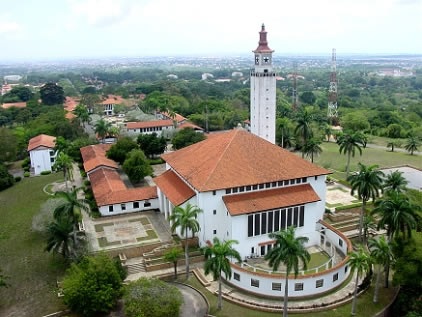University of Ghana consulted students on levies
 The Vice- Chancellor of the University of Ghana, Prof. Ernest Aryeetey, has explained that students were consulted before the introduction of the GH¢100 levy to be paid from the 2013-2014 academic year.
The Vice- Chancellor of the University of Ghana, Prof. Ernest Aryeetey, has explained that students were consulted before the introduction of the GH¢100 levy to be paid from the 2013-2014 academic year.
Advertisement
During the consultation, he said, some students supported it, while others were against it, and a majority of them were indifferent to the fee which was being charged to enable the university to raise funds to complete three building projects.
The projects are the Faculty of Arts, School of Performing Arts and the School of Allied Sciences.
Addressing the press in Accra on Wednesday on a wide range of development issues in the university, Prof. Aryeetey said the university had been obliged to, as a result of its growing needs and the need to finance its projects, ask its students for help.
“So at the beginning of this academic year, we made students aware that they would be required to help, that many of these things (projects) cannot be done simply by the state nor simply from looking at the private sector, so students would have to contribute.
“In this regard, starting from February this year, soon after the council of the university had approved the fee structure for the coming year, I went round all the halls of residence to canvass the views of students on various possible measures that we could take, and one of the things I brought to the table in the discussions with students was the imposition of a levy of GH¢100 to be paid by each student for a specific purpose.”
Prof. Aryeetey said the university would need GH¢4 million to complete the first two buildings, and was therefore requiring each of the 38,000 students to contribute GHC100 towards the projects.
The process at arriving at the levy, he said, involved students leaders at every stage, from the finance committee, executive committee and the university council level.
He said the university recognised the different backgrounds the students came from and so it was its obligation to assist those who could not finance their stay in the university.
Prof. Aryeetey mentioned the students’ financial aid that supported the students, adding that unfortunately, most students in the past did not apply to the financial aid office for support.
In response to pleas from students, he said, the university had decided that in the coming academic year, students would not need to pay all their fees at a go, and that “they can pay 50 per cent in the first semester and 50 per cent in the second semester, a major variation of the university’s policy that required all students to pay their fees in full at the beginning of the academic year”.
2013-2014 Admissions
On admissions for the 2013-2014 academic year, Prof. Aryeetey noted that the university had taken a decision to provide admission to as many students as possible without unduly burdening the university structures.
Research university
The first thing, he said, the authorities were doing was to make the University of Ghana a research university, and that as a research university, the institution would focus more and more on the problems that gravitated against the enhancement of the economy.
“Effectively we are looking for solutions to the problems of Ghana, that is what research is going to allow us to do. We believe that the functions that we performed for the nation over the last 65 years are such that we need to move on to another level, largely because there are other institutions that are capable of filling whichever gaps we leave behind.”
Collegiate system
In pursuit of that research agenda, he said, the university was being restructured by breaking it into four different colleges to make it much more effective and efficient.
The four colleges are the current College of Health Sciences, which is being restructured, the College of Basic Applied Sciences (an aggregation of the existing Faculty of Science, College of Agriculture and Consumer Sciences and Faculty of Engineering Sciences), the College of Humanities (an aggregation of the current Faculty of Social Sciences, Faculty of Arts, the Faculty of Law and the Business School) and the new College of Education, designed to bring improved teaching methods and new technology into the way people are prepared for a teaching career at the basic, secondary and tertiary levels.
“The four colleges should make it easier to take decisions on academic programmes, reach students and make students reach a larger breadth of programmes. So in decentralising, we wish to make it easier for our researchers to do research, we wish to make it easier for our lecturers to teach and we wish to make it easier for our students to have access to more programmes of academic nature”.
Prof. Aryeetey added that apart from having the colleges in place, the university believed that its research should have a clearer focus so instead of doing everything, “we should focus on distinct areas that would add to the university stature.”
“We have decided to focus our research on four areas; malaria, food production and food processing, climate change adaptation and establishment of a centre of excellence for policy monitoring and evaluation.”
He said as Ghana introduced new initiatives in social protection and other areas, it was important that a lot of studies were done into the impact of those polices on the intended beneficiaries.
As part of the process of becoming a research university, Prof. Aryeetey indicated that the university was restructuring its PhD programmes by moving from a less formalised way of conducting PhD research to a much more structured way found in many universities.
By Emmanuel Bonney & Alima Awudu / Daily Graphic / Ghana




